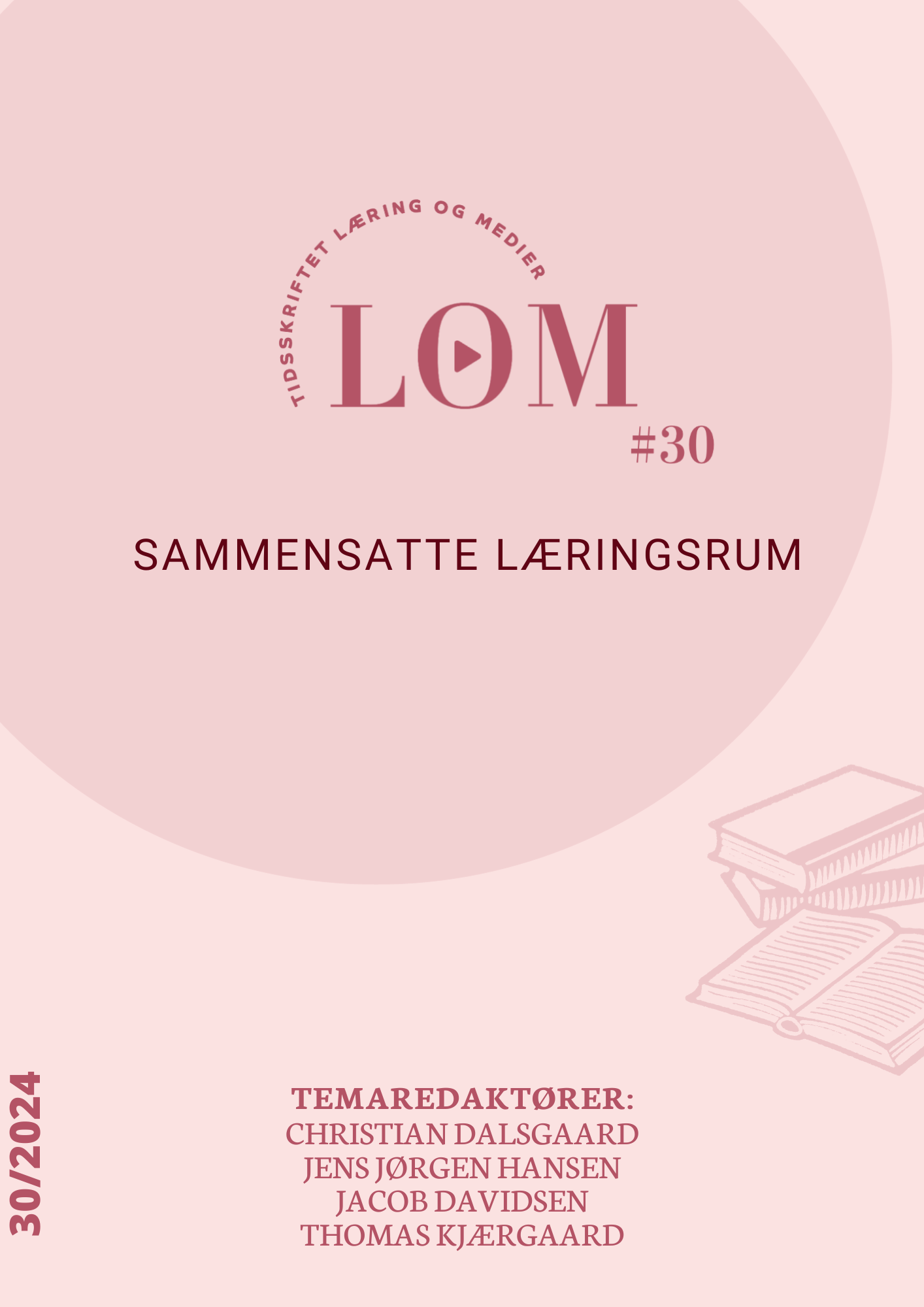Vi kan skabe sporet sammen
Studerende som medudviklere af læringsdesignet for deres egen uddannelse
DOI:
https://doi.org/10.7146/lom.v17i30.143093Abstract
The article presents a project where the goal is to establish an equal collaboration between teacher and students regarding the learning design of the students' education. The work with learning design (cf. Dohn et al., 2019), is based on Fawns' formulation of an Entangled Pedagogy, which i.a. focuses on the students' participation in the design work. Based on post-structuralism (Juelskjær & Plauborg, 2013; Søndergaard, 2005; Focault, 2002), qualitative, empirical data (focus group interviews) are analysed to uncover the student perspective on the overall research question: What characterizes the students' contribution when invited to co-develop the learning design for their education?
The purpose is two-fold: Firstly, to qualify our knowledge of possibilities and limitations in involving students directly in learning design processes, and secondly, to test a development and analysis method which focuses on the participants' narratives in the empirical material. It is concluded that this method for involving the students in the design process is fruitful in terms of elucidating the students' values in connection with their education. Finally, methodological perspectives concerning a teaching practice, where students are invited throughout the entire educational process, cf. Fawns, to take co-responsibility for the learning design, are discussed.
Downloads
References
Andenæs, A. (2000). Generalisering. Om ringvirkninger og gjenbruk av resultater fra en kvalitativ undersøkelse. I: H. Haavind (red.) Kjønn og fortolkende metode. Metodiske muligheter i kvalitativ forskning (s. 287-320). Gyldendal Norsk Forlag.
Barad, K. (2007). Meeting the Universe Halfway: Quantum physics and the entanglement of Matter and Meaning. Duke University Press
Biesta, G.J.J. (2019). Letting Art Teach: Art Education After Joseph Beuys. ArtEZ Press.
Bloksgaard, L., & Andersen, P. T. (2012). Fokusgruppeinterviewet: Når gruppedynamikken er redskabet. I M.H. Jacobsen & SQ. Jensen (red.), Kvalitative udfordringer(s. 25-44). Hans Reitzels Forlag.
Breil, L. L. (2023). Isbryderen: Kan en legende tilgang til læring bryde fastfrosne forståelser og opleves af de studerende som et værdifuldt bidrag til deres uddannelse og praksis? UCN Perspektiv, (12), 59–68. https://doi.org/10.17896/UCN.perspektiv.n12.531
Børne-og undervisningsministeriet (2023). Vejledning om Pulje til mere uddannet pædagogisk personale (opkvalificeringspuljen). https://www.uvm.dk/-/media/filer/uvm/puljer-priser-udbud/pdf23/231009-vejledning-om-opkvalificeringspuljen-2023--2025.pdf
Christensen, G. (2005). Etiske konstruktioner i det kvalitative forskningsinterview. I Jensen, T.B. & Christensen, G. (red.). Psykologiske og pædagogiske metoder -Kvalitative og kvantitative forskningsmetoder i praksis (s.s. 293-317). Roskilde Universitetsforlag.
Dalziel, J., Conole, G., Wills, S., Walker, S., Bennett, S., Dobozy, E., Cameron, L., Badilescu-Buga E. og Bower, M.l (2016) The Larnaca Declaration on Learning Design. Journal of Interactive Media in Education, 2016(1): 7, pp. 1–24, DOI: http://dx.doi.org/10.5334/jime.407
Dohn, N. B., Godsk, M., & Buus, L. (2019). Learning Design: Tilgange, cases og karakteristika. Tidsskriftet Læring Og Medier(LOM), 12(21), 20. https://doi.org/10.7146/lom.v12i21.112639
Dohn, N. B. & Hansen, J. (2016). Begrebet didaktisk design –et kritisk overblik over betydninger. I N. B.
Dohn og J. Hansen (Red), Didaktik, design og digitalisering(s. 43-64). Samfundslitteratur
Fawns, T. (2019). Postdigital Education in Design and Practice. Postdigital Science and Education, 1 132–145. https://doi.org/10.1007/s42438-018-0021-8
Fawns, T. (2022). An Entangled Pedagogy: Looking Beyond the Pedagogy—Technology Dichotomy. Postdigital Science and Education, (4), 711–728. https://doi.org/10.1007/s42438-022-00302-7
Foucault, M. (2002). The archaeology of knowledge, and the discourse on language. Pantheon Books.
Haavind, H. (1987). Liten og stor: mødres omsorg og barns utviklingsmuligheter. Oslo: Universitetsforlaget.
Halkier, B. (2002). Fokusgrupper. Roskilde, Denmark: Samfundslitteratur.
Hiim, H., & Hippe, E. (2015). Læring gennem oplevelse, forståelse og handling: en studiebog ididaktik (2. udgave). Gyldendal.
Højgaard, L., & Søndergaard, D. M. (2015). Multimodale konstitueringsprocesser i empirisk forskning. I S. Brinkmann & L. Tanggaard, (Red.). Kvalitative Metoder: En grundbog.København. Hans Reitzel: 315-339.
Juelskjær, M. & Plauborg, H. (2013). Læring og didaktik udsat for poststrukturalistisk tænkning. I A. Qvortrup & M. Wiberg (red.). Læringsteori og didaktik(s. 257-287). København: Hans Reitzels Forlag.
Downloads
Published
How to Cite
Issue
Section
License
Copyright (c) 2024 Louise Lund Breil, Marianne Georgsen, Susanne Dau

This work is licensed under a Creative Commons Attribution-NonCommercial-NoDerivatives 4.0 International License.

Articles published in the Journal of Learning and Media are licensed under a Creative Commons Attribution-NonCommercial-NoDerivatives 3.0 Unported Licens.
Authors retain copyright and grant the journal right of first publication; simultaneously articles are licensend under the Creative Commons Attribution license: Attribution-NonCommercial-NoDerviatives (by-nc-nd). Read about this license at https://creativecommons.org/licenses/by-nc-nd/3.0/
---
At LOM.dk, you will also find articles from the discontinued Journal for the Continuing and Further Education of the Danish Universities (UNEV). Note that special rules apply to UNEV articles:
It is the authors and any other copyright holder who have the copyright of articles published under the auspices of UNEV, and access to the articles is contingent on users acknowledging and complying with the associated legal guidelines:
- Users may download and print one copy of any UNEV publication for private studies or research.
- The redistribution of articles or the use of these for revenue-funded activities or commercial purposes are not allowed.
- It is not allowed to distribute the URLs of UNEV articles.


